

15 Most Interesting Self Compassion Research Findings. What is Self-Compassion and Self-Love? (Definition, Quotes + Books) Kristin Neff and Her Work on Self-Compassion (Incl. Test + Exercises) What is Mindful Self-Compassion? (Incl. Exercises + Workbooks) The Difficult Art of Self-Compassion. “Compassion,” wrote historian Karen Armstrong in considering the proper meaning of the Golden Rule, “asks us to look into our own hearts, discover what gives us pain, and then refuse, under any circumstance whatsoever, to inflict that pain on anybody else.”
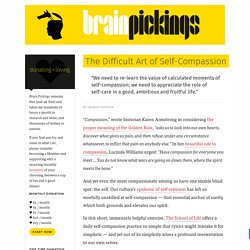
In her beautiful ode to compassion, Lucinda Williams urged: “Have compassion for everyone you meet … You do not know what wars are going on down there, where the spirit meets the bone.” And yet even the most compassionate among us have one sizable blind spot: the self. Our culture’s epidemic of self-criticism has left us woefully unskilled at self-compassion — that essential anchor of sanity, which both grounds and elevates our spirit. In this short, immensely helpful exercise, The School of Life offers a daily self-compassion practice so simple that cynics might mistake it for simplistic — and yet out of its simplicity arises a profound reorientation to our own selves. The Miracle of the Self-Compassion Habit. By Leo Babauta.
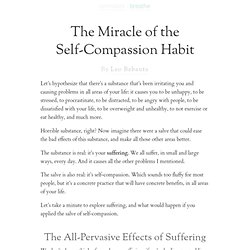
The Powerful (Happiness) Side Effects of Self-Compassion. Sometimes the most profound statements come out of children’s books.
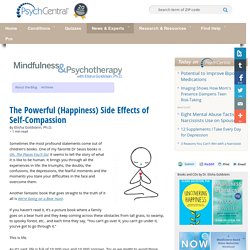
One of my favorite Dr Seuss books is Oh, The Places You’ll Go! It seems to tell the story of what it is like to be human. It brings you through all the experiences in life: the triumphs, the doubts, the confusions, the depressions, the fearful moments and the moments you stare your difficulties in the face and overcome them. Another fantastic book that goes straight to the truth of it all is We’re Going on a Bear Hunt. Cultivating Self Compassion facing difficulties. Why We Need to Practice a Little Self-Compassion. In the frantic pace of life, it can be difficult to keep up—and sometimes when we make mistakes or we feel we don’t work hard enough, we leave ourselves in the dust by thinking things like “you’re not good enough.”
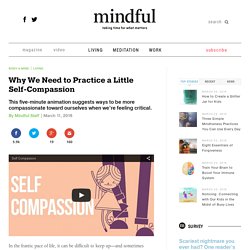
If we’re not careful, a few harsh words here and there can evolve into excessive self-criticism. This short animation from the London School of Life suggests another way to approach those negative storylines we jog through our minds, as well as the real setbacks we face—like adopting a kinder mindset toward ourselves when we fail, accepting our personal histories that we cannot change, and understanding that our worth is not only contingent on our achievements.
Mindfulness allows us to see how we respond to ourselves, and work toward a bond that’s healthier and happier. Take a few minutes and try this practice: “5 Steps to a Better Relationships with Yourself” from Mindful magazine. Compassion Made Simple. When you’re focused on any activity, whether it’s your email, listening to a friend or sitting in a formal meditation practice, your mind is bound to wander.
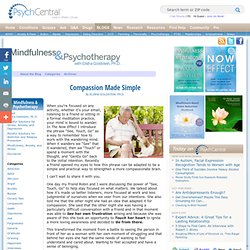
In The Now Effect I introduce the phrase “See, Touch, Go” as a way to remember how to work with the wandering mind. When it wanders we “See” that it wandered, then we “Touch” or spend a moment with the thought, and “Gently Go” back to the initial intention. Recently a friend opened my eyes to how this phrase can be adapted to be a simple and practical way to strengthen a more compassionate brain. I can’t wait to share it with you.
One day my friend Robin and I were discussing the power of “See, Touch, Go” to help stay focused on what matters. This transformed the moment from a battle to seeing the person in front of her as a woman with her own moment of struggling and that behind her eyes she had the same needs of wanting to feel understand and cared about. Navigate the Backdraft of Self-Compassion. “What if you turn up the volume on that voice in your head, as it were a radio station that’s been playing in the background, that you can’t quite hear the words to the song?”
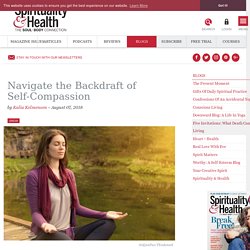
I ask clients the first time we meet. I remember being asked that question myself, and being startled by what I found. Backdraft: Why Self-Compassion can make you feel worse, and what you can do about it. - COMPASSION WITHIN. Painting by Samanta Winstanley When we read or talk about self-love, self-compassion, or self-acceptance, we’re often flooded with affirmations of how becoming more self-loving will transform us in countless positive ways.
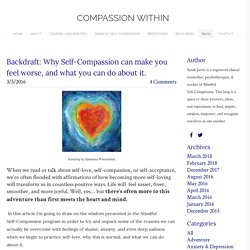
Life will feel easier, freer, smoother, and more joyful. Well, yes… but there’s often more to this adventure than first meets the heart and mind. Self Esteem vs Self Compassion. Humility. Self-Acceptance. Self-Criticism. Break. Training. Psychological Safety. Kindness. Forgiveness. How to Practice Self-Compassion: 8 Techniques and Tips.
9 Self-Compassion Exercises & Worksheets for Increasing Compassion. Mindful Self-Compassion: Core Skills. Exercises by Dr. Kristin Neff. 5 Steps to Develop Self-Compassion & Overcome Your Inner Critic. If you have a feeling that the voice in your head may be your worst critic, read on!

Because the way you talk to yourself plays a vital role on your wellbeing. Wouldn’t it be nice to feel accepted and even supported rather than criticised by that voice inside you? In this article, I will offer you five ways to help you overcome your inner critic by strengthening your self-compassion. If you were to go on a journey with someone for several decades, how important would the relationship between the two of you be?
Wouldn’t you go to quite some trouble to ensure you guys get along well? So what about that journey you’re on right now, the one called life? “You can search throughout the entire universe for someone who is more deserving of your love and affection than you are yourself, and that person is not to be found anywhere. The Relationship with Ourselves The way we perceive a situation is never the objective reality, and quite often our perception of reality can be irrational. 3 Ways to Turn Self-Criticism Into Self-Compassion. A Simple, Powerful Self-Compassion Method. By Leo Babauta When we’re frustrated with others, or feeling bad about ourselves … we often turn toward habits that comfort us: distractionsfoodshoppingsmokingdrugs/alcohol These don’t often work, because they tend to make us feel worse in the long run.
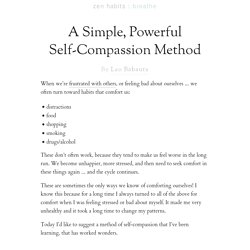
We become unhappier, more stressed, and then need to seek comfort in these things again … and the cycle continues. These are sometimes the only ways we know of comforting ourselves! Test how self-compassionate you are. Self-Compassion. Compassion - Bridging Practice and Science.
Podcasts. Emotional Agility. Growth Mindset.